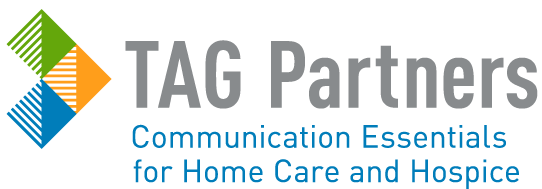Reaching an advanced age is indeed a blessing, but it comes with a long list of uncertainties. Atop that list is how to maintain an independent lifestyle. Home health and hospice provide seniors with care options that can extend their independence. TAG Partners provides home health and hospice agencies the print media to inform patients of care services, benefits, eligibility and the admission process.
TAG can help your agency capitalize on the amenity of home care in this age of convenience. Electronic media outlets tout online shopping for just about everything these days. Local grocery stores and restaurants are now promoting their home delivery services. In much the same way home health and hospice agencies need to promote the benefits of bringing health care to the patient.
The question is how to go about reaching your target market without breaking the bank. Television, radio, and digital advertising are broad and oftentimes expensive marketing mediums. Building referrals on a budget starts with defining your customers. For example, a large percentage of potential home health and hospice patients are seniors who spend a lot of time in physician and care center waiting areas. Maintaining a presence through print media in those waiting areas is a cost-effective way to reach a high concentration of potential clients. Targeted print media is an affordable marketing strategy for home health and hospice care.
Call on potential referral sources such as surgeons, orthopedic specialists, cardiologists, oncologists, pulmonary therapists, and provide disease specific patient educational brochures. We have a wide variety disease information brochures and health care flyers all customizable with your agency’s branding.
Highlight the specialized care your agency provides. Many older adults may not be aware that home health and hospice care is covered under Medicare once eligibility has been met. Our informative home health care and hospice marketing brochures explain care services, practices, and payment options all while promoting your agency.
Visit tagwebstore.com for your home health, private duty, and hospice print media. Don’t see what you need online? Call us at 866-232-6477 x 2018. We have been providing home care marketing tools for years. Let us help you design custom admission books, marketing booklets, brochures, or flyers. We have a full-service print shop and graphics department at your disposal.


